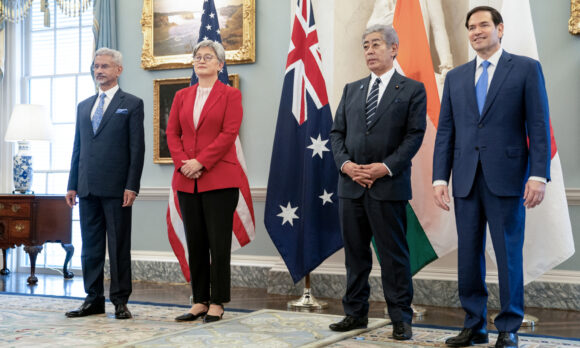Indo-Pacific Security
Within Indo-Pacific Security
The Indo-Pacific has emerged as the world’s economic and geopolitical center of gravity. This region has become the central theater in the competition between the United States and China to shape the course of the 21st century. At the same time, the nuclear and conventional threat posed by North Korea remains a flashpoint and potential catalyst for major-power war. Across the Indo-Pacific and beyond, American allies and partners are increasingly active in pursuing their interests, including engaging in new forms of security networking. More than ever before, America’s place in the world will hinge on whether it can get the Indo-Pacific right.
The CNAS Indo-Pacific Security Program explores opportunities and challenges for the United States in the region, with a special focus on the bilateral relationships and minilateral and multilateral engagements that form an evolving security network to preserve freedom of the seaways, respect for national sovereignty, and peace and prosperity. It draws on a team with senior government, congressional, and nongovernment expertise in U.S. foreign policy, intelligence analysis, international security, and regional relationships. The Indo-Pacific Security Program analyzes trends and generates practical and creative policy solutions around four core research priorities:
- U.S.-China Competition in Foreign and Security Affairs: The People’s Republic of China presents the most consequential challenge to U.S. interests and values. The Program’s China research analyzes the factors shaping Beijing’s foreign and security policies, including relations across the Taiwan Strait, and with Russia and North Korea across various regions and functional domains. The Program’s work also explores China’s grand strategy and decision-making under the rule of Xi Jinping. In addition, the Program produces cutting-edge research on the implications of People’s Liberation Army (PLA) modernization, with a focus on China’s nuclear buildup and integration of military artificial intelligence (AI) into the joint force.
- Building a Modern, Networked Indo-Pacific Regional Security Architecture: The Program’s work helps chart a course for the United States as it seeks to update its Indo-Pacific alliances and partnerships and build a more networked regional security architecture. IPS research examines how the United States can strengthen its existing relationships with high-capability allies and partners, with a focus on Japan, South Korea, Australia, the Philippines, and Taiwan. In the face of shared challenges spanning diplomacy, technology, security, and values, the Program analyzes the key pillars of these relationships and provides recommendations for how U.S. policymakers can strengthen coordination to maximize opportunities and manage challenges. The Program generates detailed agendas to build out formats including the Quad (Australia, India, Japan, and the United States), AUKUS (Australia-United Kingdom-United States), and the U.S.-Japan-South Korea trilateral. Those groups are central to constructing a more networked regional security architecture to bolster the rules-based order in the Indo-Pacific.
- U.S.-India: Realizing the Potential: India’s emergence as a global power has the potential to transform the Indo-Pacific region and the world. Its promising demographics, growing economy, advancing military capabilities, technological prowess, and enormous soft power influence position India to play a major role in shaping geopolitical trends and the future global order. The Indo-Pacific Security Program focuses on analyzing key aspects of the relationship, including defense and security, technology cooperation, supply chain resiliency, and India’s role in the Quad, taking stock of the progress in relations and exploring new areas for collaboration that will help ensure the relationship fully reaches its maximum potential.
- Challenges in South and Central Asia: The Indo-Pacific Security Program explores China’s growing role in South and Central Asia and what it means for democratic trends as well as maintaining a free and open regional order that preserves each nation’s sovereignty and independence. The Program explores whether China and Russia will increasingly compete and/or cooperate for influence in Central Asia and the implications for the United States. In addition, the Program explores how to protect Afghan civil society and human rights and thwart continued terrorism threats emanating from the region.
Highlights
-
Global Island: Sustaining Taiwan’s International Participation Amid Mounting Pressure from China
China under Chinese Communist Party (CCP) General Secretary Xi Jinping has ramped up political, economic, and military pressure on Taiwan. The roots of Beijing’s pressure camp...
By Jacob Stokes, Alexander Sullivan & Zachary Durkee
-
Dealing with a Taliban-Controlled Afghanistan
Nearly 20 years after U.S. forces overturned Taliban rule in Afghanistan, the fundamentalist Islamist movement is back in power. This follows the U.S. troop withdrawal in summ...
By Lisa Curtis
-
Advancing a Liberal Digital Order in the Indo-Pacific
The United States and other regional democracies risk losing ground in the competition to shape Asia’s digital future. China is making rapid inroads in developing the region’s...
By Lisa Curtis, Joshua Fitt & Jacob Stokes





























